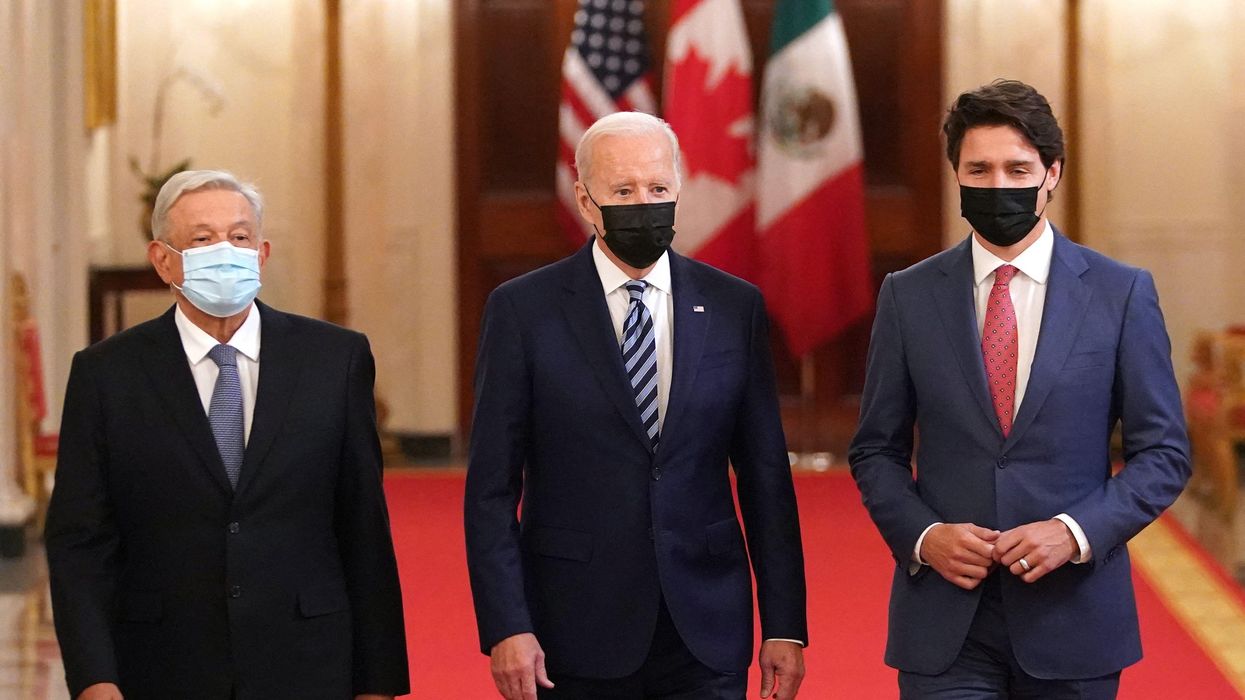
Three days before U.S. President Joe Biden, Mexican President Andres Manuel López Obrador, and Canadian Prime Minister Justin Trudeau are set to meet in Mexico City, more than 100 grassroots groups from all three countries called on the leaders on Thursday to take action together to help solve the climate crisis, end gun violence, and address injustices facing migrants across North America.
Immigration is among the issues the leaders are expected to discuss at the North American Leaders' Summit—also known as the "Tres Amigos" summit—and the groups noted that "North America is one of the deadliest regions in the world for migrants, with 2022 setting a record number of migrant deaths at the Mexico-U.S. border."
" International agreements to protect migrants from violence have been ignored and undermined, leaving thousands of families stranded at borders as a result," reads the letter, which was sent as Biden announced new U.S. immigration policies including an expansion of the Trump administration's expulsions of migrants to Mexico under Title 42, under which Biden will expel up to 30,000 people per month unless they arrive in the U.S. via a humanitarian parole program.
"International agreements to protect migrants from violence have been ignored and undermined, leaving thousands of families stranded at borders."
The groups called on Biden, Trudeau, and López Obrador—commonly known as AMLO—to "increase economic opportunities and cut violence in communities of origin" as well as respect the human rights of all migrants and asylum-seekers and end "policies that promote arbitrary and hostile action toward migrants."
The letter, which was spearheaded by Global Exchange and signed by groups including March for Our Lives, Amazon Watch, and Witness at the Border, also came as Global Exchange co-executive director Marco Castillo wrote about the interlocking issues of gun violence, the climate emergency, and immigration in a Newsweek opinion piece on Thursday.
"I hope that addressing the underlying causes of immigration—including gun violence and climate change—will be discussed" at the Tres Amigos summit, Castillo wrote, adding:
The illegal flow of guns across borders mostly lands in the hands of Mexican paramilitary, corrupt police, and cartels. Roughly 70% of the firearms involved in homicides in Mexico can be traced back to the U.S....The problem is so prolific, the Mexican government filed a $10 billion lawsuit against U.S. gun manufacturers and distributors in 2021 for damages caused by illegal gun trafficking. U.S. federal courts dismissed the lawsuit last year, thanks to America's all but untouchable gun lobby. The immunity that American gun manufacturers have is offensive and needs to end.
[...]
Another issue driving forced migration across North America is climate change. From Guatemala to the Artic Circle, the increasing frequency and severity of forest fires, droughts, storms, and floods are displacing entire communities, threatening livelihoods and traditional ways of life. People of color, low-income communities, women, and Indigenous peoples are impacted most severely.
While Canada ranks far below the U.S. and Mexico in terms of gun violence and gun-related deaths, the letter sent to the three leaders noted, the country is not immune to injustices linked to the prevalence of firearms.
"In Canada, from 2007 to 2017, First Nations (Indigenous communities) accounted for one-third of people shot to death by national police officers," reads the letter. "Black Canadians are 20 times more likely to be shot and killed by the police than white people."
The Latin America Working Group called on the leaders "to work together for peace without guns."
The grassroots groups also pointed to recent comments made by Trudeau's government regarding the climate crisis in its 2022-23 development plan on environmental and climate change, which stated, "We are seeing the impacts of climate change including the increased frequency and severity of forest fires, extreme heat events, storms, and flooding... causing significant consequences to Canadian and First Nations communities, economies, and way of life."
"We are among the first to feel the consequences of climate change in Canada," said Melissa Iakowi:he'ne' Oakes, a Mohawk woman and executive director of the North American Indigenous Center of New York, which signed the letter. "It affects our ancestral lands, which affects our food security, economies, culture, and identities, and worsens the health inequities we're already experiencing."
The letter includes a list of several demands ahead of the talks between Biden, Trudeau, and AMLO, including:
Take concrete measures to end U.S. gun exports and trafficking to Mexico, including banning assault weapons across the region, increasing restrictions for sales, and canceling transfers to corrupted police and military units; End immunity for gun manufacturers in the U.S. and hold them and their dealers accountable for crimes committed with their weapons; Develop a regional plan to dramatically reduce fossil fuel emissions across the continent; Support climate-related disaster prevention and readiness for impacted communities, and propel a new green economy to generate jobs while protecting the environment; and Show deference to the practices of Indigenous peoples, who have proven to be the best protectors of the environment, and allow Indigenous communities to maintain control of ancestral territories.
 1 year ago
76
1 year ago
76


